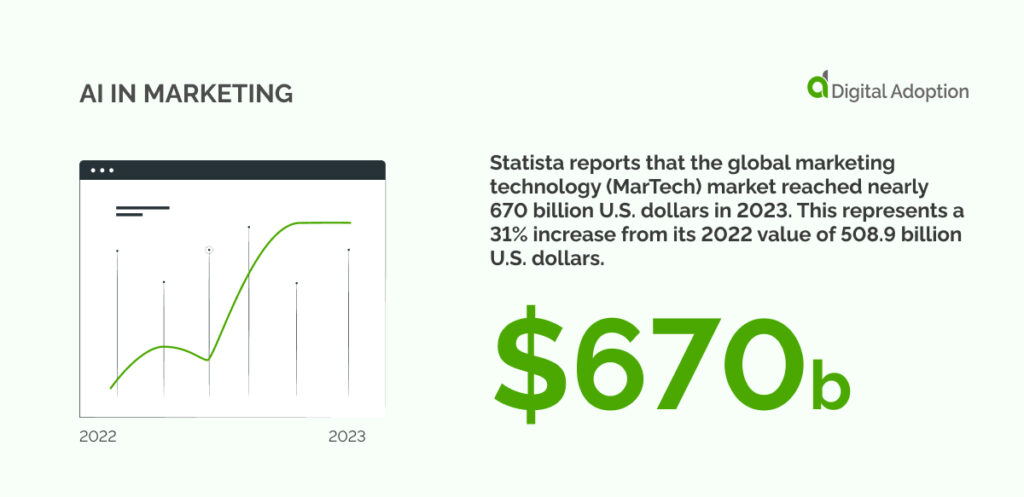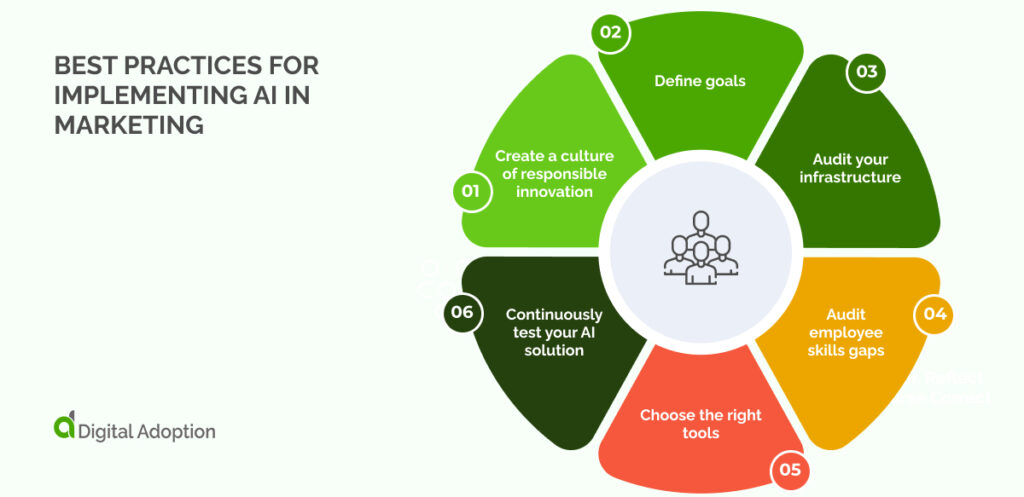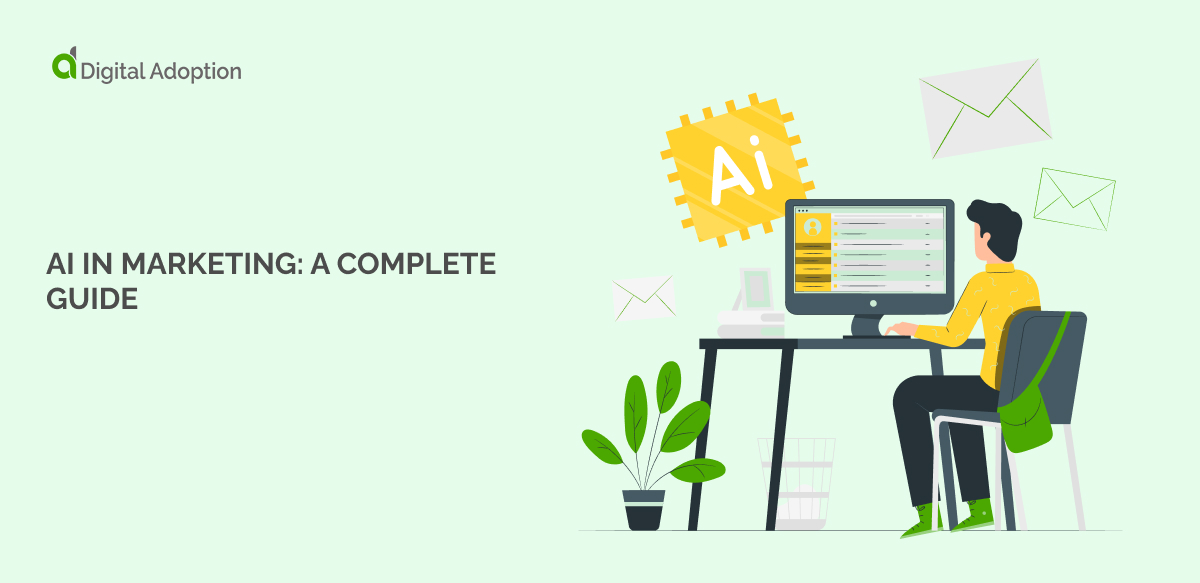Industrial growth has long paved the way for the invention of new ground-breaking technology. Today, the tables have flipped and created a self-fulfilling cycle wherein technology prevails as a core driver of innovation across industries.
This self-improving feedback loop looks only to continue with major advances in AI technologies today, sparking even more digital transformation sector-wide.
One field set to benefit from AI? The marketing industry.
Shifting customer expectations and market demands require businesses to make equally impactful changes in marketing strategies and sales campaigns. AI in marketing addresses these demands with various solutions for improving internal and customer-facing processes.
This guide offers an up-to-date understanding of AI in marketing. It will define AI, showcase its value-driving applications, and explore its benefits and challenges. It also provides best practices for maximizing AI solutions in marketing.
What is artificial intelligence in marketing?
AI in marketing involves adopting AI-enabled technologies to improve core marketing functions, such as business process automation, decision-making, customer care, and sales operations.
Today’s marketing professionals are augmenting their reach through AI, with various technologies capable of simulating and even outperforming human intelligence to complete tasks.
Machine learning-enabled apps learn from data to detect patterns and predict outcomes with hair-splitting accuracy. This can assist in forecasting customer demands and preferences to adjust product offerings.
Deep learning (DL) empowers generative AI, pushing the envelope in limitless content and idea generation. This provides a new resource for enlivening advertising campaigns and personalizing CX at scale.

The upper limit for its potential seems out of sight from the very material risks and concerns posed by AI. Statista reports that the global marketing technology (MarTech) market reached nearly 670 billion U.S. dollars in 2023. This represents a 31% increase from its 2022 value of 508.9 billion U.S. dollars.
What are some examples of AI in marketing?
Now that we know more about how AI impacts marketing, let’s examine the key application areas receiving the most attention.
Predictive analytics for customer insights
AI examines data to identify trends and patterns, offering undiscovered insights into customer behavior. These insights help businesses predict future behaviors like purchase likelihood and churn rates.
Example: Companies can use predictive analytics to accurately segment their audience, target high-value customers, and personalize their marketing strategies. For example, retailers can forecast which products will be popular and optimize inventory and marketing efforts accordingly.
Personalized marketing
AI customizes marketing efforts by analyzing customer data, such as browsing history, purchase patterns, and social media interactions. This allows for the creation of highly personalized messages and offers. Personalized marketing enhances customer engagement by ensuring the content is relevant and timely.
Example: AI can suggest products a customer is likely to buy next or tailor email campaigns to include personalized product recommendations, thus increasing the chances of conversion.
AI-Driven chatbots and virtual assistants
AI-powered chatbots and virtual assistants enhance customer service by responding instantly to inquiries and support requests. These tools can handle various tasks, from answering common questions to guiding customers through the purchasing process. They are available 24/7, ensuring that customers receive assistance at any time.
Example: Advanced chatbots can analyze the context of conversations to offer more accurate and helpful responses. This improves customer satisfaction and allows human agents to focus on more complex and high-value tasks.
Dynamic pricing optimization
AI algorithms adjust prices in real-time based on various factors such as demand, competition, and customer behavior. Dynamic pricing strategies help businesses maximize revenue and maintain competitive pricing.
Example: E-commerce platforms can use AI to lower prices during periods of low demand to boost sales or increase prices when demand is high. Airlines and hotels commonly use dynamic pricing to adjust rates based on booking patterns and availability, optimizing revenue throughout the year.
Automated content creation and curation
AI tools generate and curate content by analyzing what resonates with target audiences. These tools can produce various types of content, including blog posts, social media updates, and product descriptions. AI-driven content creation ensures consistency and saves marketers time.
Example: AI can create social media posts aligning with current trends or draft product descriptions highlighting key features and benefits. It can also curate content by selecting relevant articles, videos, and posts to share with followers, ensuring the content is engaging and valuable.
Programmatic advertising
AI automates the buying of ads by using real-time data to target specific audiences. Programmatic advertising uses algorithms to bid on ad spaces automatically, optimizing ad placement and spending. This process ensures that ads reach the right people at the right time based on their online behavior and preferences.
Example: An AI-driven system can place an ad for running shoes in front of users who have recently searched for fitness gear or visited sports-related websites. This precise targeting increases the effectiveness of advertising campaigns and improves ROI.
Sentiment analysis
AI-powered sentiment analysis examines customer feedback, social media posts, and reviews to gauge public opinion and emotions toward a brand or product. By understanding customer sentiment, businesses can respond promptly to negative feedback. This improves their products and enhances customer service.
Example: If sentiment analysis reveals a surge in negative comments about a recent product update, the company can quickly address the issues, communicate changes, and mitigate potential damage to its reputation.
Email marketing optimization
AI enhances email marketing by analyzing data to optimize send times, subject lines, and content for better engagement. AI tools can segment email lists based on customer behavior and preferences, ensuring each recipient receives relevant messages.
Example: AI can determine the optimal time to send emails to different segments, increasing open and click-through rates. AI can also personalize email content by including product recommendations based on past purchases. This makes the emails more appealing and effective.
Image and voice recognition
AI image and voice recognition technologies enable new ways of interacting with customers and enhancing marketing strategies. Image recognition can be used in social media monitoring to track brand mentions and user-generated content.
Example: A company can identify and engage with customers who post photos of their products. Voice recognition, on the other hand, powers virtual assistants like Siri and Alexa, allowing brands to reach customers through voice-activated devices. This opens up new marketing channels and opportunities for customer engagement.
Customer journey mapping
AI helps map the customer journey by analyzing touchpoints and interactions across various channels. This mapping allows businesses to understand how customers move through the sales funnel. It can also identify pain points or opportunities for improvement.
Example: AI can track customers’ journey from their first website visit to their final purchase, providing insights into the most effective marketing efforts. This information helps businesses refine their strategies and increase conversion rates.
Social media monitoring
AI tools monitor social media platforms to track brand mentions, competitor activities, and trending topics. This real-time monitoring enables businesses to respond quickly to customer feedback and capitalize on emerging trends.
Example: AI can detect a sudden spike in conversations about a particular product feature, allowing the company to join the discussion and promote related content. Social media monitoring also helps crisis management identify potential issues before escalating.
Sales forecasting
AI improves sales forecasting by analyzing historical data, market trends, and customer behavior to predict future sales performance. Sales forecasts enable businesses to make informed decisions about inventory management and budgeting.
Example: AI can predict seasonal product demand, helping retailers stock appropriately and plan promotions in advance. By leveraging AI-driven sales forecasting, companies can reduce costs, avoid stockouts, and enhance overall operational efficiency.
What are the benefits of AI in marketing?
Statista reports that the market value of AI reached approximately 100 billion U.S. dollars in 2023 and is projected to increase twentyfold by 2030.
This growth highlights the growing significance of AI technologies in shaping the future of marketing strategies and customer engagement.
That said, let’s look at AI’s benefits in marketing.
Improved personalization
AI revolutionizes marketing personalization by leveraging advanced algorithms to analyze extensive customer data. By understanding individual behaviors, preferences, and purchase histories, businesses can tailor their marketing messages and offers with precision.
This targeted approach enhances customer engagement and satisfaction, fosters stronger relationships, and increases the likelihood of conversions. Ultimately, improved personalization enables brands to deliver relevant content to each customer at the right time, driving customer lifetime value.
Enhanced customer insights
AI-powered analytics give businesses deep, real-time insights into customer behaviors and preferences across various channels and touchpoints. Marketers gain a comprehensive understanding of their audience’s needs and motivations by processing and interpreting large volumes of data.
This valuable insight enables businesses to make data-driven decisions, optimize marketing campaigns, and adapt strategies quickly to market changes. Enhanced customer insights empower businesses to stay competitive by anticipating trends. This ultimately drives growth and market leadership.
Optimized ad targeting
AI algorithms optimize ad targeting by analyzing vast amounts of consumer data to predict and segment audiences accurately. By identifying patterns in customer behavior and preferences, marketers can create highly targeted campaigns that resonate with specific audience segments.
This precision in ad targeting improves campaign performance metrics such as click-through and conversion rates while reducing wasted ad spend. By maximizing the relevance of ads to individual consumers, businesses can achieve higher ROAS.
Automation of routine tasks
AI-driven automation streamlines repetitive marketing tasks, freeing up valuable time and resources for marketers to focus on strategic initiatives. AI-powered tools can automate email marketing, social media management, and customer support, ensuring consistency and efficiency.
Automation improves operational resilience and enhances scalability, allowing businesses to manage larger volumes of customer interactions and marketing campaigns effectively. By automating routine tasks, companies can achieve higher productivity levels and deliver more personalized customer experiences.
Improved ROI and cost efficiency
AI enhances marketing ROI by optimizing resource allocation and campaign performance based on data-driven insights. By analyzing customer behavior patterns and predicting outcomes, AI enables marketers to allocate budgets and prioritize investments in channels that deliver the highest returns.
This optimization reduces marketing waste and improves conversion rates, leading to higher profitability and cost efficiency. Improved ROI and cost efficiency enable businesses to achieve sustainable growth, expand market reach, and maintain a competitive edge in their industry.
What are the challenges of AI in marketing?
According to the Pew Research Center, only 30% of U.S. adults can identify the common uses of AI.
This limited awareness emphasizes businesses’ challenges in integrating AI into marketing strategies and ensuring a widespread understanding of its potential benefits and ethical considerations.
Let’s take a closer look at the challenges of AI in marketing.
Data Privacy and security concerns
Implementing AI in marketing involves collecting and analyzing vast amounts of customer data, raising significant concerns about data privacy and security. Marketers must navigate regulatory frameworks such as the General Data Protection Regulation (GDPR) in Europe and the California Consumer Privacy Act (CCPA) in the United States to ensure compliance and protect consumer rights.
Maintaining transparency in data collection practices and implementing robust security measures to safeguard sensitive information is paramount. Addressing these challenges is crucial to maintaining customer trust and mitigating potential risks associated with data breaches or misuse.
Integration and compatibility issues
Integrating AI-powered tools and platforms into existing marketing systems and technologies poses challenges due to compatibility issues and data silos. Marketers often encounter complexities in aligning disparate systems, ensuring seamless data flow, and maintaining data integrity across platforms.
Overcoming these integration challenges requires strategic planning, technical expertise, and custom development to achieve interoperability and maximize the benefits of AI in marketing operations.
Skills gap and training needs
Adopting AI in marketing necessitates a workforce proficient in data analytics, machine learning, and AI technologies. However, the industry has a significant skills gap and a shortage of professionals trained to leverage AI tools effectively.
Marketers need training programs and ongoing education to enhance their understanding of AI applications, interpret AI-driven insights, and integrate AI into strategic decision-making processes. Bridging the digital gap and cultivating a data-literate workforce is critical for maximizing AI’s potential in driving marketing innovation and competitive advantage.
Ethical use of AI in marketing
Ethical considerations surrounding the use of AI in marketing present challenges related to fairness, transparency, and accountability. Issues such as algorithmic bias, where AI systems inadvertently discriminate against certain demographics or perpetuate stereotypes, require careful scrutiny and mitigation strategies.
Marketers must adhere to governance, risk, and compliance guidelines and best practices to ensure that AI-driven decisions and recommendations align with ethical standards and respect consumer rights. Developing frameworks for ethical AI use, fostering diversity in AI development teams, and engaging in transparent communication with stakeholders are essential steps toward ethical AI adoption in marketing.
Cost and resource allocation
While AI offers the potential for efficiency gains and improved return on investment (ROI) in marketing, initial investments in AI technologies, infrastructure, and talent acquisition can be substantial. Marketers face challenges in justifying these upfront costs and demonstrating the long-term value of AI investments to stakeholders.
Effective cost management strategies, such as phased implementation and prioritizing high-impact AI initiatives, are essential for optimizing resource allocation and maximizing ROI. Balancing short-term budget constraints with long-term strategic objectives is key to successfully integrating AI into marketing strategies and achieving sustainable growth.
Best practices for implementing AI in marketing

As businesses increasingly embrace AI technologies to enhance marketing strategies, it becomes imperative to establish clear goals aligned with business objectives.
Organizations can effectively integrate AI tools that optimize operations and drive growth by auditing existing infrastructure and identifying employee skills gaps.
Choosing the right AI solutions and continuously testing their effectiveness ensures strategic alignment and enhances campaign outcomes. Nurturing a culture of responsible innovation ensures ethical AI deployment and upholds data privacy and transparency.
These best practices enable businesses to leverage the real potential of AI and achieve a competitive advantage.
Let’s explore further.
Define goals
Begin by clearly defining specific and measurable goals that align with your business objectives. These goals should serve as the foundation for your AI implementation strategy, guiding decisions and ensuring that AI initiatives contribute directly to achieving desired outcomes such as increased customer engagement, enhanced ROI, and operational efficiency improvements.
Audit your infrastructure
Conduct a thorough assessment of your current marketing infrastructure to identify potential gaps and compatibility issues related to integrating AI technologies. Evaluate the scalability and robustness of your data management systems, CRM platforms, and digital architecture to ensure they can effectively support AI-driven processes without compromising performance or data integrity.
Audit employee skills gaps
Assess your marketing team’s skill sets to identify areas where additional training and development in AI technologies, data analytics, and machine learning are needed. Provide targeted learning opportunities and resources to empower employees with the knowledge and expertise required to leverage AI tools effectively in their daily marketing activities.
Choose the right tools
Select AI tools and platforms that align with your strategic goals and operational requirements. Consider factors such as scalability, compatibility with existing systems, security features, and vendor support when evaluating potential solutions. Choosing the right AI tools ensures seamless integration, optimal performance, and the ability to leverage advanced capabilities for enhanced marketing effectiveness.
Continuously test your AI solution
Implement a structured testing and experimentation framework to evaluate the performance and impact of AI solutions in real-world marketing scenarios. Monitor key metrics, analyze data-driven insights, and iterate on strategies to refine AI algorithms, improve targeting accuracy, and enhance overall campaign outcomes. Continuous testing allows for ongoing optimization and adaptation of AI strategies to maximize ROI and achieve long-term business objectives.
Create a culture of responsible innovation
Establish a corporate culture that promotes ethical practices and responsible innovation in AI utilization. Develop and enforce guidelines for data privacy, transparency, and fairness in AI applications, ensuring compliance with regulatory requirements and maintaining trust with customers and stakeholders. Promote cross-departmental collaboration to embed ethical considerations into AI-driven decision-making processes, fostering a culture of ongoing enhancement and conscientious AI utilization.
What does the future of AI in marketing look like?
A recent Price Waterhouse Cooper (PwC) study estimates that by 2030, artificial intelligence (AI) will generate more than USD 15 trillion for the global economy and boost local economies by as much as 26%.
This means adapting to AI-driven technologies will be pivotal for seizing growth opportunities. It includes enhancing customer insights and optimizing marketing strategies to stay competitive.
Mastering AI-driven transformation is essential for digital marketers to leverage data effectively, predict trends, and make informed decisions. Using and implementing AI correctly will enable marketers to streamline operations and transform customer experiences at scale. It also unlocks new avenues for managing innovation and market expansion.
In today’s digital environment, adopting AI isn’t just advantageous—it’s necessary to stay ahead of the competition.
As AI continues to redefine marketing practices, those who embrace it will excel in navigating the future of marketing and business.









